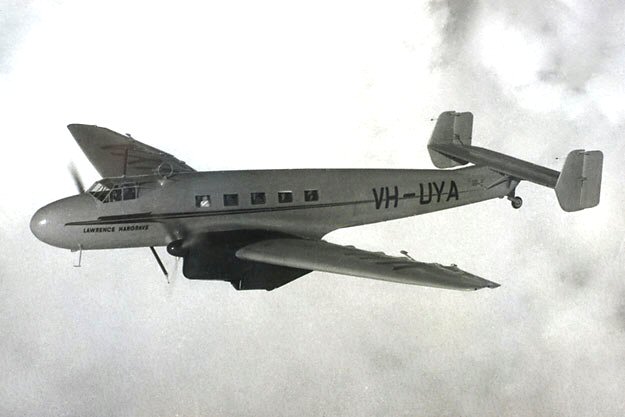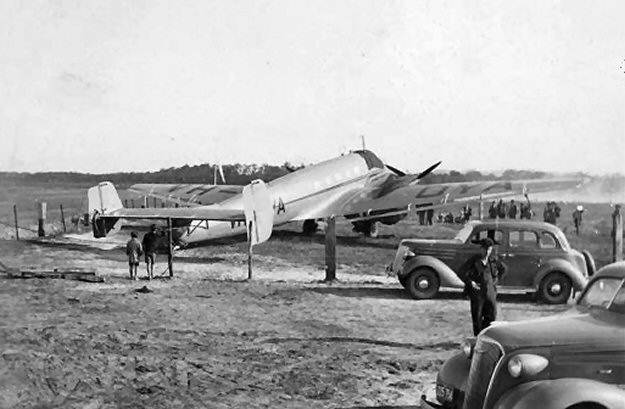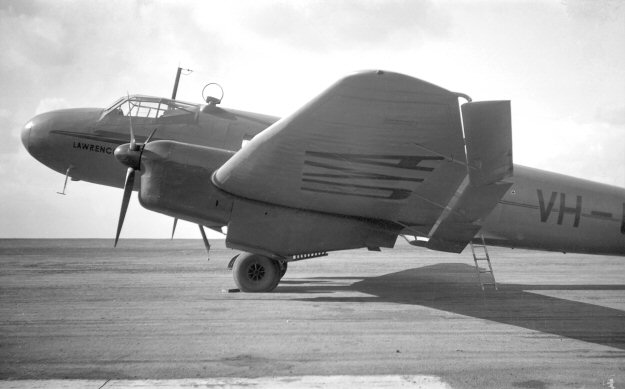VH-UYA
Junkers Ju86
(c/n 86/0952)

This image above is from the Len
Dobbin collection, via the Civil Aviation Historical Society
archives, whilst the one immediately below is from the National Library
of Australia showing
the
Junkers probably at Coffs Harbour, NSW, whilst awaiting a replacement
engine. Mac
Job's image at the foot of the page was probably at Essendon in the
late 1930s. It was dogged
by
mechanical problems from the outset, and its short career in Australia
was less than spec-
acular. The history of VH-UYA is well
documented by Australian airline historian Fred
Niven and is given, in part, as follows:
This
aircraft was completed at Dessau in January 1937, as a
Ju.86B-0. Originally D-AGEY (Junkerswerke).
It was named
'Lawrence Hargrave' at
Junkerswerke, Dessau and was painted a light khaki color overall, with black
registration, fuselage-stripe
and engine nacelles. It was
acquired by Dr. E.F.R.
Beinssen, the German Trade Commissioner in Sydney, for £26000, in
a
barter deal, for a consignment of wool, for resale. An
Australian registration was applied for in late January 1937 as the aircraft
was being imported "for
re-sale for commercial purposes". Later paperwork from Dessau described it as being a "Ju86B-
Australien".
It departed Dessau 20 Feb 1937, as D-AGEY, flying via Europe & Asia; arriving
Darwin, from Timor, 15 March
1937, with a total
flying time of 69 hours.
The German registration and swastika were
removed whilst the aircraft
was at Darwin.
It had
provisionally been registered VH-UYA on 18 Mar 1937, to Dr. E.F.
Beinssen, to cover the
flight from Darwin to Melbourne.
It flew
Darwin-Charleville-Brisbane-Essendon on 26 April 1937, as VH-UYA, using its provisional
CoA. After inspection at Mel-
bourne, it was formally registered VH-UYA to E.F. Beinssen of Sydney as a 10
passenger machine. It was chartered by Airlines
of Australia, for evaluation purposes, from
14 May 1937. It ferried Melbourne-Cootamundra-Sydney on that same day and
departed
Sydney at 0805 on 17 May 1937 on its first Airlines of Australia test flight Sydney-Lismore-Brisbane,
with 4 crew (Capts
J. Mclaughlin (Airlines of
Australia) and J. Kerr (on
loan from the Civil Aviation Dept.) and Engineers H. Wolfermann
and W.
Gerisch)
plus six passengers.
It arrived Brisbane at 1100, after a flying time of 2
hours 40 mins. In the afternoon of 17 May
1937, it continued on to Townsville, with 10
passengers. On the return Brisbane-Sydney flight, during the afternoon of 20 May
1937
(with 5 passengers and mail), it was forced-landed at Coffs Harbour, NSW, after the starboard engine failed,
1.5km from
the
airport (Captains K. Virtue & J. McLaughlin; both of Airlines of Australia, plus
the 2 German engineers). Engineer Wolfer-
mann
indicated that the engine was
badly damaged and a spare had to be sent from Melbourne.
Airlines of Australia used a
Stinson A to
ferry the crew and passengers from Lismore to Sydney. VH-UYA was
then ferried to Fishermans
Bend, Melbourne
by Keith Virtue. Despite being praised by crew &
passengers, the engines'
unreliability ruined its chances of being purchased.
The aircraft was dismantled in Melbourne and departed for Germany by sea, from
Melbourne, 25 Aug 1937, on the S.S. 'Lippe'.
It was struck off the register
on 26 Sept 1937. After its return to the Junkers works in
Germany, it was reregistered D-AGEY,
still with the name
'Lawrence Hargrave', and its tails painted red with swastikas added
again.It may later have gone
to Lufthansa,
or possibly to
the South African Air Force.




